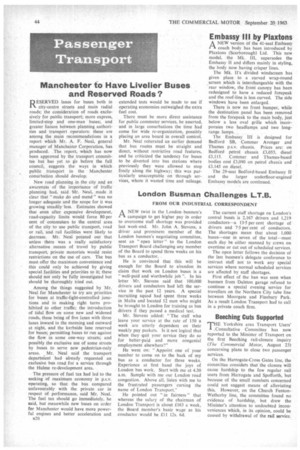Manchester to Have Livelier Buses and Reserved Roads ?
Page 46

If you've noticed an error in this article please click here to report it so we can fix it.
RESERVED lanes for buses both in city-centre streets and main radial roads; the consideration of roads exclusively for public transport; more express, limited-stop and one-man buses; and greater liaison between planning authorities and transport operators: these are among the main recommendations in a report which Mr. A. F. Neal, general manager of Manchester Corporation, has produced. The report, which has now been approved by the transport committee but has yet to fir) before the full council, suggests the ways in which public transport in the Manchester conurbation should develop.
New road planning in the city and an awareness of the importance of traffic planning had, said Mr. Neal, made it clear that "make do and mend" was no longer adequate and the scope for it was growing steadily. less. Estimates showed that even after expensive development, road-capacity limits would force 80 per cent of commuters to the central area of the city to use public transport, road or rail, and rail facilities were likely to decrease. Mr. Neal pointed out that unless there was a really satisfactory alternative . means of travel by public transport, private motorists would resist restrictions on the use of cars. The bus must offer the maximum convenience and this could only be achieved by giving special facilities and priorities to it; these should not only be fully investigated but should be thoroughly tried out.
Among the things suggested by Mr. Neal for Manchester to try are priorities for buses at traffic-light-controlled junctions and in making right turns prohibited to other traffic; the introduction of tidal flow on some new and widened roads, these being of five lanes with three lanes inward in the morning and outward at night, and the kerbside lane reserved for buses; permitting buses to' run against the flow in some one-way streets; and possibly the exclusive use of some streets by buses to serve new pedestrian-only areas. Mr. Neal said the transport department had already requested an exclusive bus road for a service through the Hulme re-development area.
The pressure of fuel tax had led to the seeking of maximum economy in p.s.v. operating, so that the bus compared unfavourably with the private car in respect of performance, said Mr. Neal. The fuel tax should go immediately, he said, but meanwhile new buses on order for Manchester would have more powerful engines and better acceleration and n20 extended tests would be made to see if operating economies outweighed the extra fuel cost.
There must be more direct assistance for public commuter services, he asserted, and in large conurbations the time had come for wide re-organization, possibly placing an area board in overall control.
Mr. Neal reiterated an earlier demand that bus routes must be straight and direct, without restrictive road features, and he criticized the tendency for buses to be diverted into bus stations where previously they were allowed to stop freely along the highway; this was particularly unacceptable on through services, where it wasted time and mileage.




















































































































